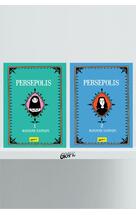Persepolis: the Story of a Childhood
Satrapi does an excellent job of defining various types of rebellion in our society. She explores the probable reasons, may they be fear or knowledge, and quite literally, illustrates the consequences. A teenager enacts rebellion by separating himself or herself from the general, and dives deeper into another extreme. Adults enact rebellion, by separating others from themselves.
One of Satrapi's many strengths is how she shows us the prevalence of social censorship during unrest. It comes to a point where everyone is out there to protect themselves. To point the finger at others, and say, "No I am not like you, you are not like me." How is a child supposed to understand the reasons and meaning of particular cultural symbols that define us? How does he or she deal with it when the clash that occurs when understanding sets in?
Persepolis is a very timely novel for today. As our society is continuingly putting up boundaries and constructing ideas of "ingroups and outgroups", it is important to realize and understand the effects on the present. We may be fighting for the future, but are we looking ahead before looking to those beside us. Her book excludes no one and doesn't place strong judgments on any particular group, though opinions are voiced. This is not a story of who was right, and who gained the most, or who suffered tragically. On the contrary, Persepolis is a novel of the importance of being aware of ourselves and understanding the consequences of change.

